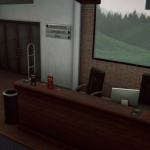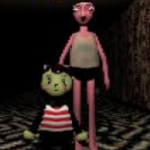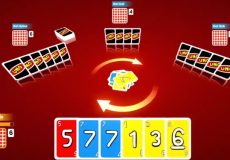

Please Dont Feed Me
Advertisement
Please Dont Feed Me is a short deck-building game where the player takes control of a creature responsible for feeding a single man. The goal is simple: help him eat four pineapples in one run without causing him to vomit. Each run starts small — with basic food cards and a limited stomach capacity. As the player feeds the man, he earns money that can be used to buy stronger or rarer foods. The process continues in cycles until either the player reaches the pineapple goal or fails by overfeeding.
Advertisement
Similiar games
Please Dont Feed Me is a short deck-building game where the player takes control of a creature responsible for feeding a single man. The goal is simple: help him eat four pineapples in one run without causing him to vomit. Each run starts small — with basic food cards and a limited stomach capacity. As the player feeds the man, he earns money that can be used to buy stronger or rarer foods. The process continues in cycles until either the player reaches the pineapple goal or fails by overfeeding.
Gameplay Overview
Gameplay is structured around turns and card management. Each turn, the player selects a food card to feed the man. Every item adds to his fullness level and generates a small amount of cash. If the total exceeds his capacity, the run resets immediately. The challenge lies in finding the right rhythm between earning and upgrading while maintaining control over the man’s stomach level. The player’s deck grows during each run, introducing more complex and risky food options.
Main gameplay features include:
· Feeding food cards to earn cash and increase fullness
· Managing capacity to prevent failure
· Buying stronger or special food cards between turns
· Unlocking new options as progress continues
· Reaching the target of four pineapples in one session
Strategy and Loop Design
Each run in Please Dont Feed Me begins with simple choices but quickly turns into strategic planning. The player must calculate how much fullness each food adds and when to risk feeding a high-value item. The pineapple, the final objective, requires preparation — enough cash to purchase it and enough tolerance to consume it. Repetition forms the structure of the game: every reset is a lesson. Players learn to prioritize cheap, low-risk food early and save for expensive cards later. Over time, patterns emerge that guide a more efficient path to success.
Player Experience and Learning Curve
The first few runs often end in quick failure as players experiment with combinations of food. Once the mechanics become clear, progress depends on balancing greed and restraint. Feeding too quickly leads to a reset, but waiting too long delays earning potential. Because each choice affects multiple variables — cash, fullness, and future options — success comes from recognizing small advantages. The gradual rhythm of playing, failing, and improving forms the main experience.
Please Dont Feed Me uses a simple deck-building structure to create a compact system of risk and reward. Each card represents a small decision that contributes to a larger outcome. The repetition of feeding, earning, and resetting encourages learning through observation. With no time pressure or combat, the focus stays on resource management and timing. The loop of progress and failure makes every run feel like part of a growing strategy rather than a restart, turning a minimal setup into a structured test of decision-making.
Discuss Please Dont Feed Me


















